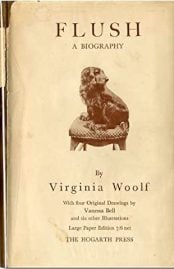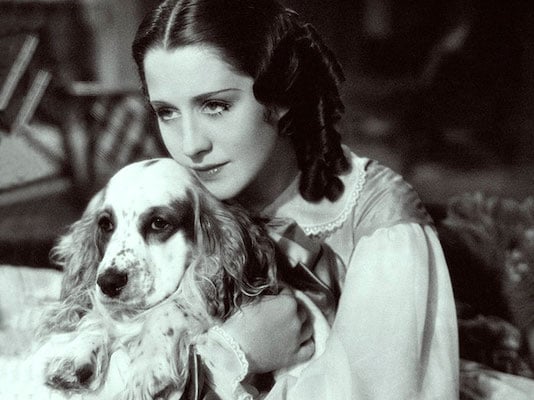To Flush, My Dog by Elizabeth Barrett Browning
By Nava Atlas | On December 11, 2020 | Updated December 15, 2020 | Comments (0)

Elizabeth Barrett Browning (1806 – 1861), the British poet, accomplished what few women writers did in her time — and that was gaining the respect and admiration of the literary world. In fact, she was far better known than her husband, fellow poet Robert Browning, in their lifetime.
Mary Russell Mitford, another writer, gave Elizabeth the cocker spaniel she named Flush as solace after the death of her brother in 1840.
From the start, Elizabeth adored Flush, so much so that she dedicated this poem to him. However, Flush wasn’t always on board with Robert Browning, his rival for Elizabeth’s affection. Browning even endured a few jealously mean bites during their legendary courtship.
Though Flush wasn’t in attendance at the Brownings’ secret wedding, he was part of their escape to Florence, Italy, where they settled in 1847. It was fortunate that he was safely at home at this juncture, as poor Flush had been stolen three times.
. . . . . . . . . .

The Literary Love Story of Elizabeth Barrett and Robert Browning
. . . . . . . . . .
Flush may not have become as famous as his mistress, but no subsequent depiction of her life story would have been complete without him. He featured in the 1934 film, The Barretts of Wimpole Street, and in Flush, a “biography” of him written by Virginia Woolf (and illustrated by her sister, Vanessa Bell), published in 1933.
It’s unclear when exactly the poem “To Flush, My Dog” was written, but it seems safe to surmise that it was sometime between when Elizabeth received him in 1840 and 1847 when she departed with him and Robert to Italy.
More on Elizabeth and Flush
- Then and There Flush with Love
- “Too Caninely Noble” — On Elizabeth’s life with Flush and Virginia Woolf’s biography
- Analysis of “To Flush, My Dog”
More poetry by Elizabeth Barrett Browning on this site
. . . . . . . . . .

Norma Shearer as Elizabeth Barrett Browning
in the 1934 film, The Barretts of Wimpole Street
. . . . . . . . . .
To Flush, My Dog
LOVING friend, the gift of one,
Who, her own true faith, hath run,
Through thy lower nature;
Be my benediction said
With my hand upon thy head,
Gentle fellow-creature!
Like a lady’s ringlets brown,
Flow thy silken ears adown
Either side demurely,
Of thy silver-suited breast
Shining out from all the rest
Of thy body purely.
Darkly brown thy body is,
Till the sunshine, striking this,
Alchemize its dulness, —
When the sleek curls manifold
Flash all over into gold,
With a burnished fulness.
Underneath my stroking hand,
Startled eyes of hazel bland
Kindling, growing larger, —
Up thou leapest with a spring,
Full of prank and curvetting,
Leaping like a charger.
Leap! thy broad tail waves a light;
Leap! thy slender feet are bright,
Canopied in fringes.
Leap — those tasselled ears of thine
Flicker strangely, fair and fine,
Down their golden inches.
Yet, my pretty sportive friend,
Little is ‘t to such an end
That I praise thy rareness!
Other dogs may be thy peers
Haply in these drooping ears,
And this glossy fairness.
But of thee it shall be said,
This dog watched beside a bed
Day and night unweary, —
Watched within a curtained room,
Where no sunbeam brake the gloom
Round the sick and dreary.
Roses, gathered for a vase,
In that chamber died apace,
Beam and breeze resigning —
This dog only, waited on,
Knowing that when light is gone,
Love remains for shining.
Other dogs in thymy dew
Tracked the hares and followed through
Sunny moor or meadow —
This dog only, crept and crept
Next a languid cheek that slept,
Sharing in the shadow.
Other dogs of loyal cheer
Bounded at the whistle clear,
Up the woodside hieing —
This dog only, watched in reach
Of a faintly uttered speech,
Or a louder sighing.
And if one or two quick tears
Dropped upon his glossy ears,
Or a sigh came double, —
Up he sprang in eager haste,
Fawning, fondling, breathing fast,
In a tender trouble.
And this dog was satisfied,
If a pale thin hand would glide,
Down his dewlaps sloping, —
Which he pushed his nose within,
After, — platforming his chin
On the palm left open.
This dog, if a friendly voice
Call him now to blyther choice
Than such chamber-keeping,
Come out! praying from the door, —
Presseth backward as before,
Up against me leaping.
Therefore to this dog will I,
Tenderly not scornfully,
Render praise and favour!
With my hand upon his head,
Is my benediction said
Therefore, and for ever.
And because he loves me so,
Better than his kind will do
Often, man or woman,
Give I back more love again
Than dogs often take of men, —
Leaning from my Human.
Blessings on thee, dog of mine,
Pretty collars make thee fine,
Sugared milk make fat thee!
Pleasures wag on in thy tail —
Hands of gentle motion fail
Nevermore, to pat thee!
Downy pillow take thy head,
Silken coverlid bestead,
Sunshine help thy sleeping!
No fly ‘s buzzing wake thee up —
No man break thy purple cup,
Set for drinking deep in.
Whiskered cats anointed flee —
Sturdy stoppers keep from thee
Cologne distillations;
Nuts lie in thy path for stones,
And thy feast-day macaroons
Turn to daily rations!
Mock I thee, in wishing weal? —
Tears are in my eyes to feel
Thou art made so straightly,
Blessing needs must straighten too, —
Little canst thou joy or do,
Thou who lovest greatly.
Yet be blessed to the height
Of all good and all delight
Pervious to thy nature, —
Only loved beyond that line,
With a love that answers thine,
Loving fellow-creature!
. . . . . . . . . . . .

More about Virginia Woolf’s biography of Elizabeth Barrett Browning’s spaniel, Flush
Leave a Reply